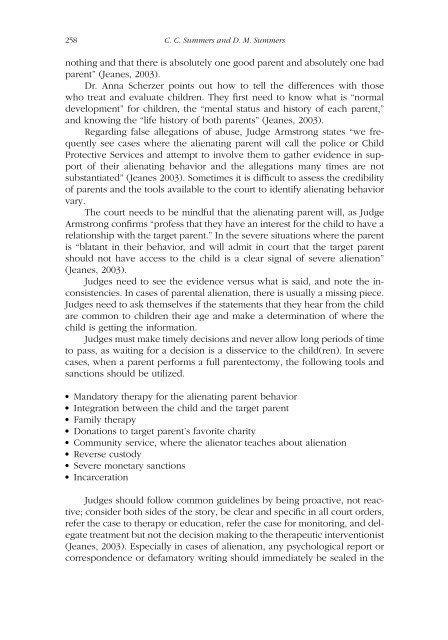Parentectomy in the Crossfire
Parentectomy in the Crossfire
Parentectomy in the Crossfire
Create successful ePaper yourself
Turn your PDF publications into a flip-book with our unique Google optimized e-Paper software.
258 C. C. Summers and D. M. Summers<br />
noth<strong>in</strong>g and that <strong>the</strong>re is absolutely one good parent and absolutely one bad<br />
parent” (Jeanes, 2003).<br />
Dr. Anna Scherzer po<strong>in</strong>ts out how to tell <strong>the</strong> differences with those<br />
who treat and evaluate children. They first need to know what is “normal<br />
development” for children, <strong>the</strong> “mental status and history of each parent,”<br />
and know<strong>in</strong>g <strong>the</strong> “life history of both parents” (Jeanes, 2003).<br />
Regard<strong>in</strong>g false allegations of abuse, Judge Armstrong states “we frequently<br />
see cases where <strong>the</strong> alienat<strong>in</strong>g parent will call <strong>the</strong> police or Child<br />
Protective Services and attempt to <strong>in</strong>volve <strong>the</strong>m to ga<strong>the</strong>r evidence <strong>in</strong> support<br />
of <strong>the</strong>ir alienat<strong>in</strong>g behavior and <strong>the</strong> allegations many times are not<br />
substantiated” (Jeanes 2003). Sometimes it is difficult to assess <strong>the</strong> credibility<br />
of parents and <strong>the</strong> tools available to <strong>the</strong> court to identify alienat<strong>in</strong>g behavior<br />
vary.<br />
The court needs to be m<strong>in</strong>dful that <strong>the</strong> alienat<strong>in</strong>g parent will, as Judge<br />
Armstrong confirms “profess that <strong>the</strong>y have an <strong>in</strong>terest for <strong>the</strong> child to have a<br />
relationship with <strong>the</strong> target parent.” In <strong>the</strong> severe situations where <strong>the</strong> parent<br />
is “blatant <strong>in</strong> <strong>the</strong>ir behavior, and will admit <strong>in</strong> court that <strong>the</strong> target parent<br />
should not have access to <strong>the</strong> child is a clear signal of severe alienation”<br />
(Jeanes, 2003).<br />
Judges need to see <strong>the</strong> evidence versus what is said, and note <strong>the</strong> <strong>in</strong>consistencies.<br />
In cases of parental alienation, <strong>the</strong>re is usually a miss<strong>in</strong>g piece.<br />
Judges need to ask <strong>the</strong>mselves if <strong>the</strong> statements that <strong>the</strong>y hear from <strong>the</strong> child<br />
are common to children <strong>the</strong>ir age and make a determ<strong>in</strong>ation of where <strong>the</strong><br />
child is gett<strong>in</strong>g <strong>the</strong> <strong>in</strong>formation.<br />
Judges must make timely decisions and never allow long periods of time<br />
to pass, as wait<strong>in</strong>g for a decision is a disservice to <strong>the</strong> child(ren). In severe<br />
cases, when a parent performs a full parentectomy, <strong>the</strong> follow<strong>in</strong>g tools and<br />
sanctions should be utilized.<br />
� Mandatory <strong>the</strong>rapy for <strong>the</strong> alienat<strong>in</strong>g parent behavior<br />
� Integration between <strong>the</strong> child and <strong>the</strong> target parent<br />
� Family <strong>the</strong>rapy<br />
� Donations to target parent’s favorite charity<br />
� Community service, where <strong>the</strong> alienator teaches about alienation<br />
� Reverse custody<br />
� Severe monetary sanctions<br />
� Incarceration<br />
Judges should follow common guidel<strong>in</strong>es by be<strong>in</strong>g proactive, not reactive;<br />
consider both sides of <strong>the</strong> story, be clear and specific <strong>in</strong> all court orders,<br />
refer <strong>the</strong> case to <strong>the</strong>rapy or education, refer <strong>the</strong> case for monitor<strong>in</strong>g, and delegate<br />
treatment but not <strong>the</strong> decision mak<strong>in</strong>g to <strong>the</strong> <strong>the</strong>rapeutic <strong>in</strong>terventionist<br />
(Jeanes, 2003). Especially <strong>in</strong> cases of alienation, any psychological report or<br />
correspondence or defamatory writ<strong>in</strong>g should immediately be sealed <strong>in</strong> <strong>the</strong>


